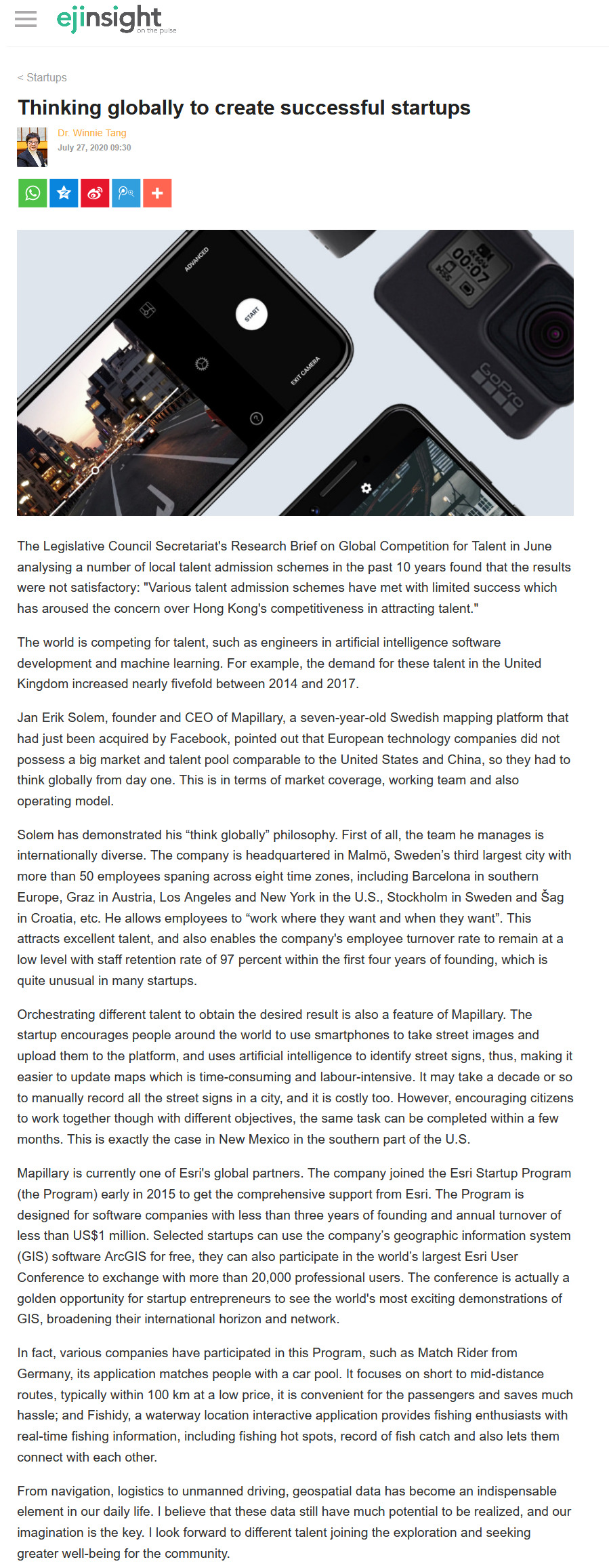網上版請按此

Thinking globally to create successful startups
The Legislative Council Secretariat's Research Brief on Global Competition for Talent in June analysing a number of local talent admission schemes in the past 10 years found that the results were not satisfactory: "Various talent admission schemes have met with limited success which has aroused the concern over Hong Kong's competitiveness in attracting talent."
The world is competing for talent, such as engineers in artificial intelligence software development and machine learning. For example, the demand for these talent in the United Kingdom increased nearly fivefold between 2014 and 2017.
Jan Erik Solem, founder and CEO of Mapillary, a seven-year-old Swedish mapping platform that had just been acquired by Facebook, pointed out that European technology companies did not possess a big market and talent pool comparable to the United States and China, so they had to think globally from day one. This is in terms of market coverage, working team and also operating model.
Solem has demonstrated his "think globally" philosophy. First of all, the team he manages is internationally diverse. The company is headquartered in Malmö, Sweden's third largest city with more than 50 employees spaning across eight time zones, including Barcelona in southern Europe, Graz in Austria, Los Angeles and New York in the U.S., Stockholm in Sweden and Šag in Croatia, etc. He allows employees to "work where they want and when they want". This attracts excellent talent, and also enables the company's employee turnover rate to remain at a low level with staff retention rate of 97 percent within the first four years of founding, which is quite unusual in many startups.
Orchestrating different talent to obtain the desired result is also a feature of Mapillary. The startup encourages people around the world to use smartphones to take street images and upload them to the platform, and uses artificial intelligence to identify street signs, thus, making it easier to update maps which is time-consuming and labour-intensive. It may take a decade or so to manually record all the street signs in a city, and it is costly too. However, encouraging citizens to work together though with different objectives, the same task can be completed within a few months. This is exactly the case in New Mexico in the southern part of the U.S.
Mapillary is currently one of Esri's global partners. The company joined the Esri Startup Program (the Program) early in 2015 to get the comprehensive support from Esri. The Program is designed for software companies with less than three years of founding and annual turnover of less than US$1 million. Selected startups can use the company's geographic information system (GIS) software ArcGIS for free, they can also participate in the world's largest Esri User Conference to exchange with more than 20,000 professional users. The conference is actually a golden opportunity for startup entrepreneurs to see the world's most exciting demonstrations of GIS, broadening their international horizon and network.
In fact, various companies have participated in this Program, such as Match Rider from Germany, its application matches people with a car pool. It focuses on short to mid-distance routes, typically within 100 km at a low price, it is convenient for the passengers and saves much hassle; and Fishidy, a waterway location interactive application provides fishing enthusiasts with real-time fishing information, including fishing hot spots, record of fish catch and also lets them connect with each other.
From navigation, logistics to unmanned driving, geospatial data has become an indispensable element in our daily life. I believe that these data still have much potential to be realized, and our imagination is the key. I look forward to different talent joining the exploration and seeking greater well-being for the community.
Dr. Winnie Tang
Adjunct Professor, Department of Computer Science, Faculty of Engineering; Department of Geography, Faculty of Social Sciences and Faculty of Architecture, The University of Hong Kong